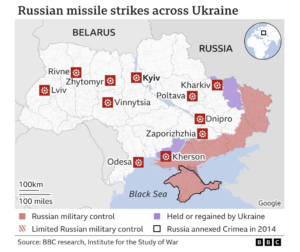Clark Forum: War in Ukraine
April 22, 2023
The Clark Forum about Russia’s war in Ukraine introduced information that I would have struggled to understand from the news individually. It was helpful to hear each of the professors’ insights, specifically on international relations and the predictions some of the professors made about the upcoming months. Logistical problems such as training on weapons from other countries and the need for ammunition for specific guns helped me understand the multiple factors that impact each aspect of the war. That, paired with the possibility of waning political, economic, and military support in the West for the war has the potential to create challenges for Ukraine. It reminds me of recent class discussions on the domestic influences on US involvement in international conflicts.

https://www.bbc.com/news/world-europe-60506682
One aspect of the presentation I found very interesting was the noting of the EU as a shifting institution, which is now providing military aid to Ukraine. We have spoken in the past about institutions shifting over time or in response to world events, such as the growing institutional effectiveness in the post-Cold War world. Nevertheless, learning about a current example illustrated how institutions must change in response to the world around them and that they are not stagnant entities. In addition to that, I found the section on economic sanctions and their historically low success rates very informative. After the onset of the war, I remember economic sanctions as one of the most discussed topics on the news, but hearing that they have low rates of success was new to me, and changed the way I think about support from the US in response to the conflict.
Overall, I found the lecture very informative but would have liked to hear more specifically about institutions, and how they might continue to play a role in the conflict.
Leave a Reply